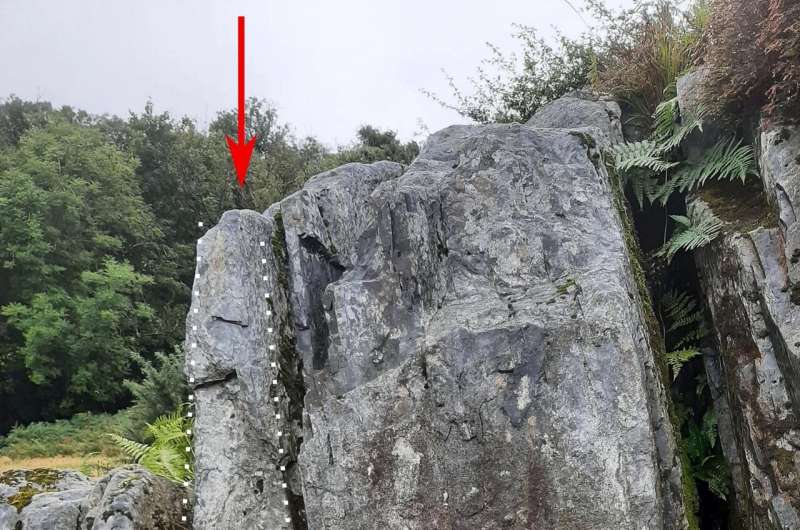Science
New Evidence Confirms Humans Transported Stonehenge Bluestones

New research led by Aberystwyth University has confirmed that the enigmatic Newall boulder, a significant fragment associated with Stonehenge, was transported by Neolithic people rather than by glacial activity. This finding sheds light on the origins of the bluestones, which are crucial to the archaeological understanding of the site.
Stonehenge, located on Salisbury Plain in England, is famed for its towering stone structures, but the smaller blue-hued megaliths, known as bluestones, have sparked considerable debate among archaeologists. These stones, sourced from Craig Rhos-y-Felin in Wales, are located over 200 kilometers away from the monument. While some researchers have suggested that glacial ice could have carried the stones to their current location, others have maintained that deliberate human transport was responsible.
The Newall boulder, a hand-sized fragment excavated in 1924 during a dig led by Lt-Col Hawley, has been pivotal in this discussion. It was removed from the site by R.S. Newall, who retained 18 stones, initiating an ongoing investigation into the boulder’s origins. As a distinct piece of stone with a detailed excavation history, the Newall boulder has served as a test case for both theories regarding the transport of the bluestones.
In the study titled “The enigmatic ‘Newall boulder’ excavated at Stonehenge in 1924: New data and correcting the record,” published in the Journal of Archaeological Science: Reports, researchers conducted extensive mineralogical, petrographic, and geochemical analyses on the boulder. Measuring 22 × 15 × 10 cm, the analyses revealed that the boulder is consistent with materials from the Rhyolite Group C, also found at Craig Rhos-y-Felin.
Further investigations showed that the Newall boulder’s bullet-shaped profile aligns with the tops of in situ rhyolite pillars at Craig Rhos-y-Felin, supporting the argument that it likely originated from the same site as other bluestones. Notably, no glacial striations were observed on the boulder, indicating that any surface abrasions were the result of weathering and not glacial transport.
Field studies across Salisbury Plain also reinforced these findings, revealing no glacial deposits or erratics—rocks carried by glaciers—within a 4-kilometer radius of Stonehenge. The absence of glacial movement signs in the area, alongside angular fragments near the monument showing evidence of human shaping, points to a clear conclusion regarding the Newall boulder’s transport.
Researchers concluded that the Newall boulder is a piece of Craig Rhos-y-Felin rhyolite, most likely broken from a monolith such as Stone 32d at Stonehenge. The combination of mineralogical and geochemical data strongly supports the hypothesis that Neolithic people were responsible for transporting the bluestones to the site.
By discrediting the glacial transport theory for the Newall boulder, this research strengthens the overall argument that all the bluestones at Stonehenge were brought there by ancient human efforts. This significant finding adds a new layer to our understanding of the site and the ingenuity of the people who built it.
The research was meticulously reviewed by experts in the field, ensuring its credibility and aligning with the rigorous standards of scientific inquiry. The implications of this study not only clarify the origins of the bluestones but also enrich the narrative surrounding one of the world’s most famous prehistoric monuments.
-

 Health3 months ago
Health3 months agoNeurologist Warns Excessive Use of Supplements Can Harm Brain
-

 Health3 months ago
Health3 months agoFiona Phillips’ Husband Shares Heartfelt Update on Her Alzheimer’s Journey
-

 Science2 months ago
Science2 months agoBrian Cox Addresses Claims of Alien Probe in 3I/ATLAS Discovery
-

 Science2 months ago
Science2 months agoNASA Investigates Unusual Comet 3I/ATLAS; New Findings Emerge
-

 Science1 month ago
Science1 month agoScientists Examine 3I/ATLAS: Alien Artifact or Cosmic Oddity?
-

 Entertainment5 months ago
Entertainment5 months agoKerry Katona Discusses Future Baby Plans and Brian McFadden’s Wedding
-

 Science1 month ago
Science1 month agoNASA Investigates Speedy Object 3I/ATLAS, Sparking Speculation
-

 Entertainment4 months ago
Entertainment4 months agoEmmerdale Faces Tension as Dylan and April’s Lives Hang in the Balance
-

 World3 months ago
World3 months agoCole Palmer’s Cryptic Message to Kobbie Mainoo Following Loan Talks
-

 Science1 month ago
Science1 month agoNASA Scientists Explore Origins of 3I/ATLAS, a Fast-Moving Visitor
-

 Entertainment2 months ago
Entertainment2 months agoLewis Cope Addresses Accusations of Dance Training Advantage
-

 Entertainment3 months ago
Entertainment3 months agoMajor Cast Changes at Coronation Street: Exits and Returns in 2025









